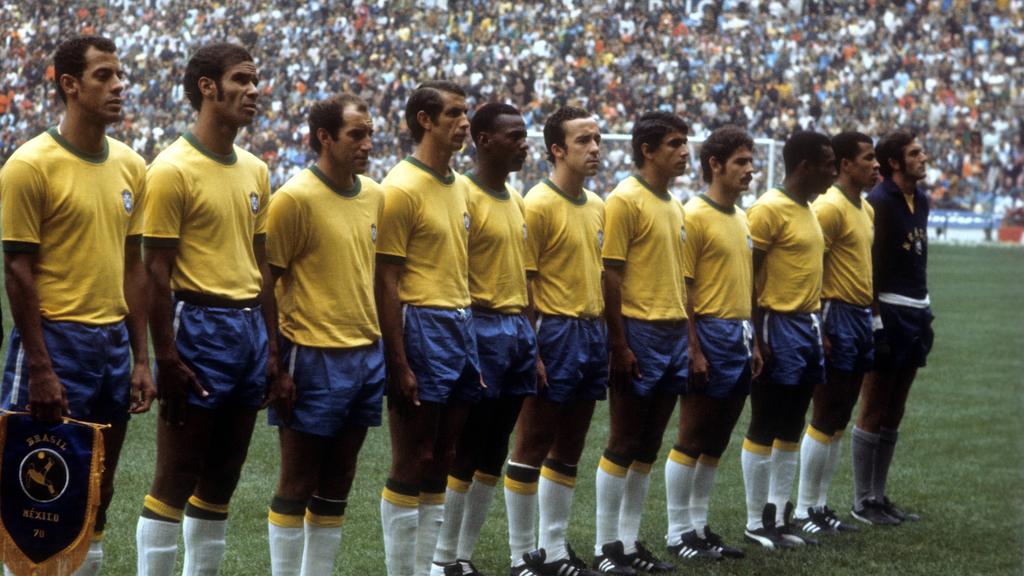Pele and his fellow World Cup-winning heroes -- The great Brazil team of 1970

Brazil's 1970 World Cup triumph in Mexico is seen as Pele's crowning glory. He was the star of what is often considered the best side the world has ever seen, but while Pele's superstardom endures to this day as he approaches his 80th birthday, others faded from view despite their huge impact on the game.
AFP Sport recalls that great team, 50 years on:
Traditionally not Brazil's strongest position, Fluminense goalkeeper Felix was considered a weak link ahead of the tournament but was respected by his teammates. He later became a car and fridge salesman. Died in 2012 aged 74 from emphysema, brought on by his heavy smoking habit.
Captain and right-back Carlos Alberto scored one of the World Cup's greatest goals, crashing home Pele's lay-off at the end of a flowing move to complete the 4-1 rout of Italy in the final.
One of the best defenders of all time, he played for years alongside Pele at Santos before rejoining him at New York Cosmos in 1977.
After working as a coach in Brazil, Mexico, Colombia, Nigeria and Azerbaijan, he retired in 2005 and became a television pundit. Died aged 72 in 2016.
A centre-back known for having a short temper, he played for a host of Brazil's biggest clubs, including Vasco da Gama, Flamengo and Corinthians, before retiring in 1979 aged 40.
Played for Cruzeiro between 1964 and 1979, winning the Copa Libertadores in 1976. The 1970 World Cup was the highlight of his international career, though he captained the team at the 1974 finals. Now 77, Wilson went into the petrol business when his playing days were over.
Coach Mario Zagallo gave Everaldo his big chance in 1970 after first-choice left-back Marco Antonio was ruled out. Died in a car crash with his wife and a daughter in October 1974. His memory lives on in the badge of former club Gremio, which contains a gold star representing their one member of the 1970 side.
One of two World Cup winners to score in every match of a finals, winger Jairzinho was Brazil's top scorer in 1970 with seven goals in six games. He was also a key part of the side which came fourth in 1974.
Played over 400 games for Rio club Botafogo before a spell with Marseille. Later tried to become mayor of Rio but his candidacy was cancelled because he did not pay the fees. Now 75, he worked as a coach and is credited with discovering Brazil's Ronaldo in the 1990s.
At fault for Roberto Boninsegna's goal for Italy in the final, Clodoaldo is more famous for the hypnotic sashaying that sent four Italians packing during the move that led to Carlos Alberto's iconic strike. Also scored in the semi-final against Uruguay.
Played the vast majority of his career with Pele at Santos, and after retiring dabbled in property management and even managed the East Timor national team in 2010.
Brazil's playmaker and scorer of the crucial goal that put the Selecao 2-1 up in the final, a trademark left-foot thunderbolt from distance.
The Sao Paulo player's passing and shooting ability was such that he was nicknamed "Golden Left Foot". Won the Silver Ball for the second best player at the finals behind Pele.
The moustachioed Corinthians midfielder was 24 when Brazil claimed the trophy. Scored their opening goal at the tournament in the win over Czechoslovakia and also netted in the quarter-final against Peru and semi-final against Uruguay.
Considered one of the most elegant players in the game's history, he popularised the "flip-flap" shimmy and was one of Diego Maradona's biggest inspirations.
This was Pele's third World Cup victory after his brilliant displays as a teenager inspired the 1958 triumph in Sweden and his injury-hit 1962 campaign.
He had also been effectively kicked out of the 1966 finals but returned in style in Mexico at the age of 29, scoring four times including the opener in the final.
It is a testament to the quality of Pele's play in Mexico that he is remembered for the goals he didn't score as much as for the ones he did -- an outrageous attempt to lob Czechoslovakia's goalkeeper from inside his own half and a magical dummy against Uruguay in the semi-finals are among the finest moments of World Cup history.
A star for Santos, he finished his playing career with New York Cosmos, before retiring and taking up roles such as that of Brazil's Extraordinary Minister for Sport and as an ambassador for numerous commercial brands.
Pele's strike partner, Tostao, now 73, scored both of his 1970 goals in the 4-2 quarter-final win over Peru. With Cruzeiro at the time, he was forced to quit football aged 26 due to eye problems picked up in a training accident, and subsequently qualified as a doctor before becoming one of Brazil's most prominent pundits.






